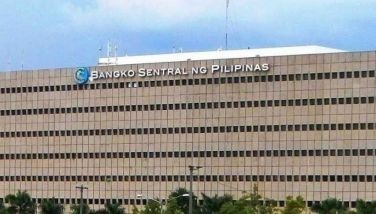Banks unload over P100-B worth of bad assets
May 26, 2005 | 12:00am
Banks have unloaded over P100-billion worth of bad assets and bad loans under the Special Purpose Vehicles Act (SPVA) as financial institutions rushed to beat the April deadline for application for incentives.
The Bangko Sentral ng Pilipinas (BSP) reported that many banks tried to beat the April expiration of the incentives under the SPVA, a strong indication that the government would meet its target coverage of at least P100 billion.
BSP Deputy Governor Ernesto Espenilla said the BSP had received applications for incentives for P104 billion worth of non-performing assets and non-performing loans although the approved and qualified transactions could be lower.
Espenilla said the completed transactions that have been qualified for incentives was still P52 billion but the BSP was processing the rest of the applications for incentives.
"Some of these transactions might not qualify for incentives so the actual number might be lower than P104 billion but we are confident that it would be over P100 billion," Espenilla said.
At the end of March, the BSP said it was unlikely that the total transactions qualified for incentives would reach P100 billion but Espenilla said many banks tried to beat the deadline before the incentives expired.
Espenilla said the P104-billion total already included the P11.9 billion worth of non-performing loans sold by the United Coconut Planters Bank (UCPB) which officially signed off the entire portfolio last month.
The BSP admitted early on that it was powerless to actually compel banks to take the haircut and unload their bad assets at a loss, but regulators still decided to assign higher risk-weighting on bad loans and bad assets to force banks to unload.
The carrot-and-stick approach, according to Espenilla, compelled banks to take more aggressive steps to reduce their NPL levels or incur more costs in supporting their NPLs.
"If banks don’t sell their NPLs, they only appear they’re not losing in their books," Espenilla explained. "But in reality, a lot of them have to actually borrow in order to support their high levels of NPLs. It’s throwing good money after bad."
According to Espenilla, raising the risk-weighting of NPLs and NPAs would consequently force banks to set aside higher reserves to cover their NPLs and
NPAs. The higher the reserve requirement, the less money they have to lend and invest.
"Ultimately, banks with high levels of NPAs would be forced to raise their capital just to support their bad assets and bad loans," he pointed out. "Even if they have to take a deep discount when selling their bad assets and loans, it would still be cheaper to sell than to retain them in their books."
The Bangko Sentral ng Pilipinas (BSP) reported that many banks tried to beat the April expiration of the incentives under the SPVA, a strong indication that the government would meet its target coverage of at least P100 billion.
BSP Deputy Governor Ernesto Espenilla said the BSP had received applications for incentives for P104 billion worth of non-performing assets and non-performing loans although the approved and qualified transactions could be lower.
Espenilla said the completed transactions that have been qualified for incentives was still P52 billion but the BSP was processing the rest of the applications for incentives.
"Some of these transactions might not qualify for incentives so the actual number might be lower than P104 billion but we are confident that it would be over P100 billion," Espenilla said.
At the end of March, the BSP said it was unlikely that the total transactions qualified for incentives would reach P100 billion but Espenilla said many banks tried to beat the deadline before the incentives expired.
Espenilla said the P104-billion total already included the P11.9 billion worth of non-performing loans sold by the United Coconut Planters Bank (UCPB) which officially signed off the entire portfolio last month.
The BSP admitted early on that it was powerless to actually compel banks to take the haircut and unload their bad assets at a loss, but regulators still decided to assign higher risk-weighting on bad loans and bad assets to force banks to unload.
The carrot-and-stick approach, according to Espenilla, compelled banks to take more aggressive steps to reduce their NPL levels or incur more costs in supporting their NPLs.
"If banks don’t sell their NPLs, they only appear they’re not losing in their books," Espenilla explained. "But in reality, a lot of them have to actually borrow in order to support their high levels of NPLs. It’s throwing good money after bad."
According to Espenilla, raising the risk-weighting of NPLs and NPAs would consequently force banks to set aside higher reserves to cover their NPLs and
NPAs. The higher the reserve requirement, the less money they have to lend and invest.
"Ultimately, banks with high levels of NPAs would be forced to raise their capital just to support their bad assets and bad loans," he pointed out. "Even if they have to take a deep discount when selling their bad assets and loans, it would still be cheaper to sell than to retain them in their books."
BrandSpace Articles
<
>
- Latest
- Trending
Trending
Latest
Trending
Latest
Recommended




























